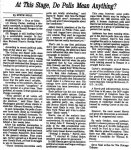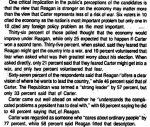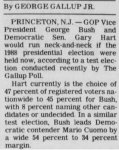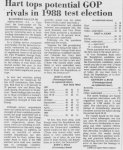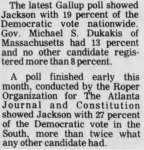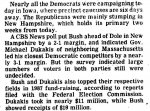
JULY 1980 - THE GOP CONVENTION AND REAGAN TO THE LEAD
At the beginning of July, Gerald Ford (yet again) opened his mouth and removed all doubt. After declaring in March that Reagan could not win, Ford used the period just before the Detroit-based Convention to declare that the election was going to be decided in the House of Representatives because of John Anderson's candidacy. John White, chairman of the DNC, sent a completely different message and one that would later make the petulant actions of Carter regarding Anderson make sense: a vote for Anderson was a vote for Reagan. The NY Times poll released at the start of the month did not support either speculation:
NYT POLL:
Reagan 49
Carter 36
Three-man
Reagan 43
Carter 27
Anderson 1
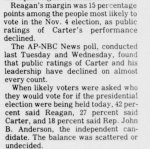
So if Reagan would lose 6 points to Anderson and Carter would lose 8 points, sure, a SLIGHT bit more of taking from Carter than Reagan but hardly enough to justify the conclusion of White. And since Anderson used this same time frame to tell the whole world he was not going to campaign in the South, what then? Indeed, this suggested Anderson's candidacy by itself wasn't really worth all that much anyway. But Anderson's declaration was rooted in another reality: Jimmy Carter was already set to lose the election in July 1980 because the South that had provided 92 of his 297 electoral votes. In fact, if Carter lost ONLY TEXAS plus one other state anywhere, he was finished. And Carter had won Ohio in 1976 by less than 11,000 votes, meaning all Reagan had to do to win was hold onto the Ford states and take Texas OR Ohio plus one small state (Carter had barely won Mississippi, Pennsylvania, New York and Wisconsin, in 1976).

Reagan arrived in Detroit - without a running mate at this point - with the usual lead that happens when the incumbent is in trouble and the challenger is not very well-known.
AP/NBC Poll (July 14)
Reagan 42
Carter 27
Anderson 18
Undecided 13
Ronald Reagan accepted his nomination and was left with one decision to make: who should be the running mate? And much like looking back years later after the selection of an Alabama head football coach, the names on the list are often interesting.
Gerald Ford, George H.W. Bush, Phillip Crane, Richard Lugar, Jack Kemp, John Connally, Howard Baker were all prominent names. But only two had any stature, Ford as a former President and Bush, with a resume a mile long and a 1/2 inch deep. Reagan chose Bush despite serious reservations about his strength, a leftover grudge from Reagan burying him in New Hampshire with the microphone line. Plus - you have to remember this - Bush was from Texas and in 1980, Texas was still part of the Democratic Party's electoral base vote. In the century-long span since 1876, Democrats had won Texas in the general election 22 out of 26 times - and two of those Republican wins had been General Eisenhower, who was originally from Denison, TX.
Reagan then went to ground for awhile. And after the full bump of his Convention, he was sitting pretty. Carter, meanwhile, had rallied from a 74% DISAPPROVAL rating in October 1979 to knock down the Kennedy challenge.
The myth of "Carter would have won but the hostages" needs to be revised to the more reality based "Carter wouldn't have won the nomination without the hostages." The point, though, is Carter had spent much of two years in electoral trouble. And he still had to get ahold of the nomination from the Kennedy boomlet.




